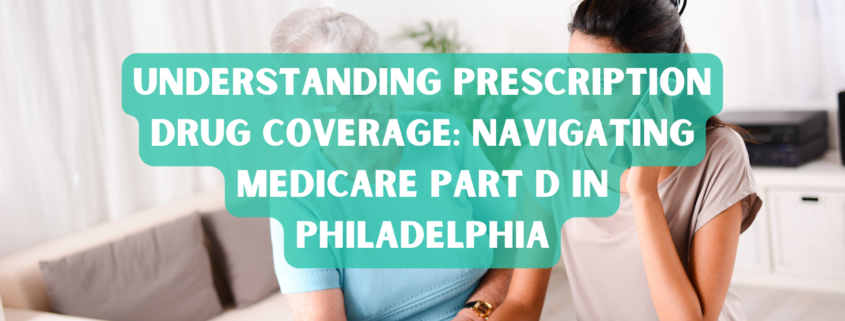Understanding Prescription Drug Coverage: Navigating Medicare Part D in Philadelphia
For many seniors in Philadelphia, Medicare Part D provides vital prescription drug coverage, ensuring access to necessary medications. However, understanding the intricacies of Part D can be complex. In this blog post, we’ll delve into the essentials of Medicare Part D, shedding light on its benefits, enrollment process, coverage stages, and key considerations.
Benefits of Medicare Part D:
Medicare Part D is a separate prescription drug plan available to all Medicare beneficiaries in Philadelphia and beyond. It offers significant benefits, helping individuals afford their medications and maintain their health. By enrolling in a Part D plan, seniors gain access to a wide range of prescription drugs, including both generic and brand-name medications. This coverage extends to essential treatments, preventive drugs, and medications required for managing chronic conditions, providing a comprehensive solution for pharmaceutical needs.
Enrollment Process:
Navigating Medicare Part D begins with the enrollment process. Eligible individuals can enroll during their Initial Enrollment Period (IEP) when they first become eligible for Medicare. Alternatively, the Annual Open Enrollment Period (October 15th to December 7th) offers an opportunity to join, switch, or drop a Part D plan. It’s crucial to choose a plan that aligns with specific medication needs, as plans can differ in terms of formulary, cost, and participating pharmacies in Philadelphia.
Coverage Stages:
Medicare Part D includes distinct coverage stages that impact out-of-pocket costs. The Initial Deductible stage requires beneficiaries to cover a set deductible amount before the plan coverage begins. Once this stage is cleared, the Initial Coverage stage kicks in, where individuals share the costs with their plan. As the total drug costs increase, beneficiaries transition into the Coverage Gap (also known as the “donut hole”), where they pay a larger portion for both brand-name and generic drugs. However, in recent years, there have been provisions to reduce costs during this stage. Finally, once out-of-pocket spending reaches a threshold, beneficiaries enter the Catastrophic Coverage stage, offering more substantial cost-sharing relief.
Key Considerations:
When selecting a Medicare Part D plan in Philadelphia, several key considerations should be taken into account. These include evaluating the formulary to ensure essential medications are covered, checking the plan’s preferred pharmacies, estimating annual drug costs, and assessing the plan’s overall cost structure, including premiums, deductibles, and copayments. Reviewing these factors enables beneficiaries to choose a plan that aligns with their medical needs and budget.
Conclusion:
Medicare Part D is an indispensable aspect of healthcare for Philadelphia seniors, providing access to vital prescription medications. By understanding the enrollment process, coverage stages, and essential considerations, beneficiaries can make informed decisions to ensure they receive the medications they need while effectively managing their healthcare expenses.








Leave a Reply
Want to join the discussion?Feel free to contribute!